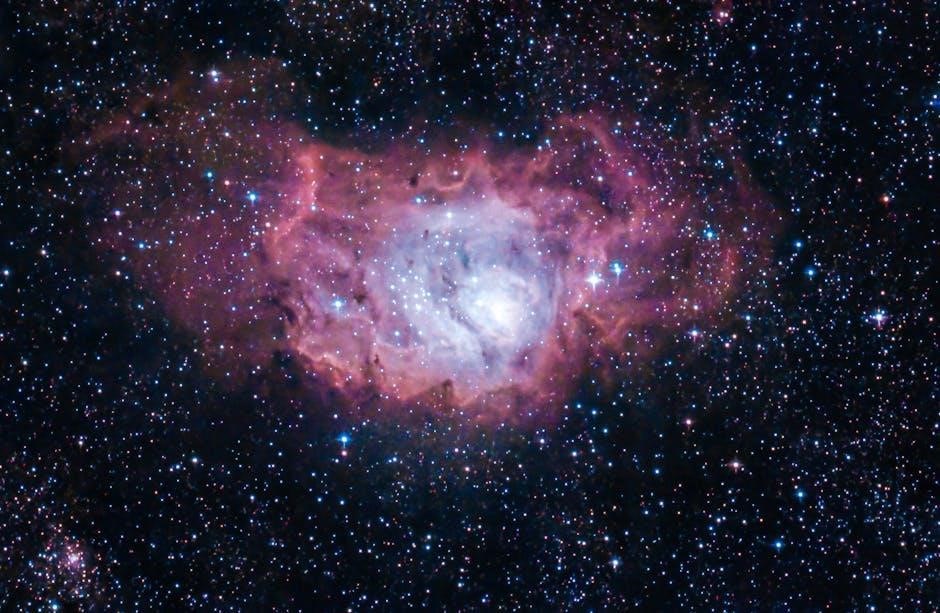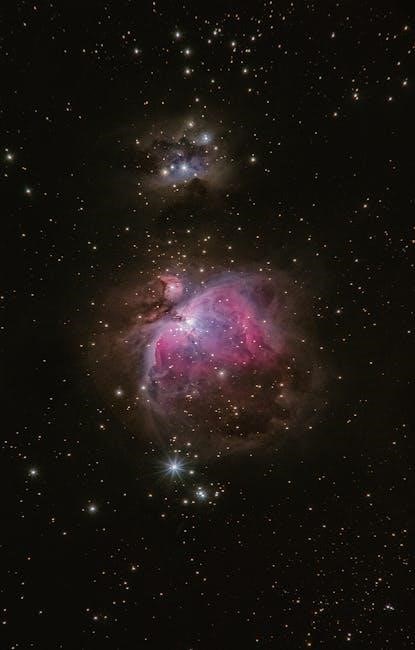Douglas Adams’ iconic novel blends humor and sci-fi‚ following Arthur Dent’s cosmic adventures. This cult classic explores life’s absurdities‚ featuring the Heart of Gold spaceship and the enigmatic answer 42.
Overview of the Book and Its Significance
The Hitchhiker’s Guide to the Galaxy‚ written by Douglas Adams‚ is a groundbreaking science fiction comedy that has become a cult classic. The book follows the misadventures of Arthur Dent‚ the last human surviving Earth’s demolition‚ and his journey through space. It explores themes of existentialism‚ technology‚ and the absurdity of life‚ all while maintaining a humorous tone. The novel’s significance lies in its unique blend of wit and philosophy‚ making it a standout in the sci-fi genre. Its influence extends beyond literature‚ shaping pop culture and inspiring adaptations across various media. The book’s exploration of the ultimate question of life‚ the universe‚ and everything‚ culminating in the enigmatic answer “42‚” has cemented its place as a timeless classic.

Science Fiction and Comedy Elements
The Hitchhiker’s Guide to the Galaxy masterfully combines science fiction and comedy‚ creating a unique narrative that appeals to a wide audience. The book’s humor arises from absurd situations‚ satirical takes on sci-fi tropes‚ and witty dialogues between characters. Science fiction elements are rich‚ with detailed descriptions of space travel‚ alien civilizations‚ and advanced technologies like the Heart of Gold spaceship. The comedic approach makes complex sci-fi concepts accessible and entertaining‚ while the sci-fi elements provide a rich backdrop for the story’s humor. This blend has made the book a cult classic‚ influencing both literature and popular culture‚ ensuring its enduring and respected legacy in both genres.

The Main Plot and Key Themes

The story follows Arthur Dent’s journey after Earth’s destruction‚ exploring themes of existence‚ humanity‚ and the cosmos. It blends absurdity with philosophical questions about life’s meaning and the universe’s randomness.

The Destruction of Earth and the Beginning of the Journey
The story begins with Earth’s demolition to make way for a hyperspace bypass‚ erasing humanity’s existence. Arthur Dent‚ the last human survivor‚ is rescued by Ford Prefect‚ an alien writer for the Hitchhiker’s Guide to the Galaxy. This event sets the stage for Arthur’s chaotic journey through space‚ exploring themes of existential crisis and the absurdity of life. The destruction of Earth symbolizes the universe’s indifference to human significance‚ while Ford’s intervention marks the start of Arthur’s unlikely adventure alongside alien companions. This pivotal moment blends humor with tragedy‚ establishing the tone for the rest of the narrative.

The Ultimate Question of Life‚ the Universe‚ and Everything
The novel revolves around humanity’s existential quest for understanding‚ symbolized by the Ultimate Question. The supercomputer Deep Thought’s quest to find the answer highlights the futility of seeking simplistic solutions to life’s complexities. This question embodies humanity’s innate curiosity and the search for meaning in an indifferent universe. Douglas Adams uses satire to explore the absurdity of human existence‚ suggesting that even the most profound questions may have answers that lack inherent meaning. This theme resonates throughout the narrative‚ reflecting on the human condition and the limitations of knowledge in understanding the cosmos.
The Role of the Heart of Gold Spaceship
The Heart of Gold‚ a stolen spaceship‚ serves as the primary vehicle for the misadventures of Arthur‚ Ford‚ Zaphod‚ and Trillian. Equipped with the Infinite Improbability Drive‚ it enables improbable journeys‚ facilitating encounters with various alien species and planets. The ship’s advanced technology and unpredictable nature drive the plot forward‚ allowing the characters to explore the galaxy in unconventional ways. Its presence underscores the themes of chance and unpredictability‚ while its quirky design and malfunctioning systems add comedic elements to the story. The Heart of Gold is central to the narrative‚ enabling the characters’ cosmic escapades and shaping their experiences in the vast expanse of space.
Key Characters and Their Roles
Arthur Dent‚ Ford Prefect‚ Zaphod Beeblebrox‚ and Trillian form the core group‚ each bringing unique traits to the story. Their dynamics and interactions drive the plot and explore themes of humanity‚ absurdity‚ and survival in the galaxy.
Arthur Dent: The Reluctant Hitchhiker
Arthur Dent‚ an ordinary Earthman‚ becomes the unlikely hero after Earth’s destruction. Rescued by Ford Prefect‚ his alien friend‚ Arthur embarks on a chaotic journey through space. His reluctance stems from the abrupt loss of his home and the absurdity of the universe. Despite his lack of preparedness‚ Arthur shows resilience‚ adapting to unimaginable situations. His humanity and emotional responses contrast with the cosmic chaos‚ making him relatable. Arthur’s journey explores themes of survival‚ friendship‚ and the search for meaning in an indifferent universe. His character represents the everyday person thrust into extraordinary circumstances‚ highlighting the complexity of human nature in the face of the unknown.
Ford Prefect: The Alien Writer
Ford Prefect‚ an alien from Betelgeuse‚ is a researcher for the Hitchhiker’s Guide to the Galaxy. Disguised as a human‚ he rescues Arthur Dent just before Earth’s destruction. His calm demeanor contrasts with Arthur’s panic‚ showcasing his adaptability. Ford is resourceful and witty‚ often providing comedic relief. His friendship with Arthur highlights loyalty amidst chaos. Ford’s knowledge of the galaxy proves invaluable‚ guiding Arthur through alien worlds. Despite his cynical outlook‚ he embodies resilience and ingenuity‚ making him an essential character in the story’s journey. His role bridges humanity and the cosmos‚ illustrating the bond between two vastly different beings in an unpredictable universe.
Zaphod Beeblebrox: The Two-Headed President
Zaphod Beeblebrox‚ the charismatic and eccentric two-headed president of the galaxy‚ is a central figure in the story. His dual heads reflect his split personality—charismatic and confident yet reckless and self-centered. Zaphod’s presidency is marked by chaos and unpredictability‚ often driven by his whims. Despite his flaws‚ he is a key player in the Heart of Gold’s adventures. Zaphod’s relationship with Trillian and Ford reveals his deeper‚ more vulnerable side. His leadership style is unconventional‚ blending humor and recklessness. Zaphod’s character adds depth to the story‚ showcasing both the absurdity and complexity of political power in the galaxy.
Trillian: The Human Companion
Trillian‚ a brilliant and resourceful human woman‚ plays a pivotal role in the story. She is one of the few humans to survive Earth’s destruction‚ rescued by Zaphod Beeblebrox. Trillian’s calm and rational demeanor contrasts with the chaos around her. Her relationship with Arthur Dent evolves from initial acquaintance to deep affection. Trillian’s intelligence and quick thinking often help the crew navigate challenges. Despite being human‚ she adapts remarkably to the vastness of space and alien encounters. Trillian’s character represents resilience and humanity amidst the galaxy’s absurdities‚ making her an essential and endearing figure in the narrative.

The Supercomputer Deep Thought and the Answer 42
Deep Thought‚ a supercomputer‚ was created to find the Ultimate Answer to Life‚ the Universe‚ and Everything. After 7.5 million years‚ it revealed the answer: 42.
The Concept of Deep Thought
Deep Thought is a supercomputer designed by hyper-intelligent‚ pan-dimensional beings to find the Ultimate Answer to Life‚ the Universe‚ and Everything. It took 7.5 million years to compute‚ revealing the answer as 42; However‚ the beings realized they didn’t know the actual question‚ leading to the destruction of Earth to build an even larger computer‚ Earth itself. Deep Thought symbolizes humanity’s quest for meaning and the absurdity of seeking simple answers to complex existential questions. Its creation highlights the blend of humor and philosophy in Adams’ work‚ making it a central element of the story’s exploration of cosmic mysteries and human folly.
The Significance of the Number 42
The number 42 is the ultimate answer to the question of Life‚ the Universe‚ and Everything‚ as revealed by Deep Thought. However‚ its significance lies in its apparent randomness and lack of a defined question. Douglas Adams chose 42 for its ordinary nature‚ emphasizing the absurdity of seeking simple answers to complex existential questions. The number has since become a cultural icon‚ symbolizing the search for meaning in an indifferent universe; It reflects the book’s themes of existential humor and the futility of human attempts to find definitive answers to life’s mysteries. 42 has transcended the story‚ becoming a widely recognized symbol of cosmic irony and philosophical inquiry.
Philosophical Implications of the Answer
The answer “42” raises profound philosophical questions about the nature of existence and the search for meaning. Deep Thought’s calculation‚ taking 7.5 million years‚ highlights the futility of seeking simple answers to life’s complexities. The absence of a clear question underscores the absurdity of human attempts to impose order on an indifferent universe. This mirrors existential themes‚ suggesting that meaning is subjective and must be created by individuals. The book challenges readers to embrace life’s ambiguity rather than rely on predetermined answers. Its humor and satire provoke reflection on humanity’s place in the cosmos‚ encouraging a deeper exploration of purpose and existence.

The Hitchhiker’s Guide to the Galaxy as a Cultural Phenomenon
This iconic novel has transcended literature‚ influencing pop culture‚ inspiring adaptations‚ and fostering a dedicated fan base. Its witty humor and cosmic themes continue to captivate audiences globally.
Impact on Science Fiction Literature
The Hitchhiker’s Guide to the Galaxy revolutionized science fiction by blending humor with cosmic themes‚ challenging traditional genre norms. Its unique approach to storytelling‚ combining satire and absurdity‚ influenced countless authors and creators. The book’s irreverent style and exploration of existential questions redefined how sci-fi could engage audiences. By incorporating comedy‚ Adams made complex ideas accessible‚ appealing to a broader readership. This blend of intellect and wit has inspired writers to experiment with unconventional narratives. The novel’s success paved the way for satire in sci-fi‚ leaving a lasting legacy in literature and popular culture. Its impact remains evident in modern works that embrace similar tones and themes.
Adaptations and Popularity
The Hitchhiker’s Guide to the Galaxy has transcended its literary success through various adaptations‚ including radio plays‚ TV series‚ and a feature film. These adaptations have introduced the story to new audiences‚ cementing its cultural relevance. The radio series‚ which first aired in 1978‚ is particularly celebrated for its faithful adaptation of Adams’ wit. The 2005 film‚ while diverging slightly from the original‚ brought the story to the big screen‚ attracting global attention. The book’s popularity endures‚ with its quotes and phrases‚ like “The Answer to the Ultimate Question of Life‚ the Universe‚ and Everything is 42‚” becoming ingrained in pop culture. Its timeless appeal continues to captivate fans across generations.
Fan Following and Legacy
The Hitchhiker’s Guide to the Galaxy boasts a devoted fan base that cherishes its unique blend of humor and philosophy. Fans worldwide celebrate the book’s legacy through fan art‚ cosplay‚ and community events. Its influence extends beyond literature‚ inspiring countless works in media and technology. The iconic number “42” has become a cultural symbol‚ often referenced in science‚ technology‚ and popular media. Douglas Adams’ creation continues to inspire new generations‚ embedding itself as a timeless classic in the hearts of millions. Its legacy endures as a testament to the power of imaginative storytelling and its ability to resonate across cultures and decades.

The Hitchhiker’s Guide to the Galaxy remains a timeless blend of humor and philosophy‚ offering insights into life’s absurdities. Its legacy as a cult classic endures‚ captivating readers with its unique charm and the enigmatic answer‚ 42.
Final Thoughts on the Book’s Relevance
The Hitchhiker’s Guide to the Galaxy continues to resonate with readers due to its unique blend of humor and philosophical inquiry. Its exploration of existential questions‚ such as the meaning of life‚ remains timeless. The book’s ability to balance absurdity with profound insights makes it a relatable and thought-provoking read. Adams’ witty dialogue and imaginative storytelling have cemented the novel’s place in science fiction literature. As a cultural phenomenon‚ it challenges readers to reflect on humanity’s role in the universe‚ ensuring its relevance across generations. Its enduring popularity highlights its universal appeal and intellectual charm.
Why “The Hitchhiker’s Guide to the Galaxy” Remains Timeless
The Hitchhiker’s Guide to the Galaxy endures as a timeless masterpiece due to its universal themes and innovative humor. Douglas Adams’ exploration of existential questions‚ paired with his satirical take on human nature‚ continues to captivate readers. The book’s blend of absurdity and intellectual depth ensures its relevance across generations. Its memorable characters‚ such as Arthur Dent and Ford Prefect‚ resonate with audiences seeking both entertainment and introspection. The novel’s ability to balance science fiction with relatable human emotions solidifies its place in literature. Its influence on popular culture and enduring fan base further highlight its lasting impact and timeless appeal.

